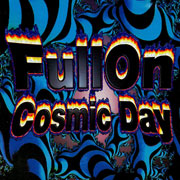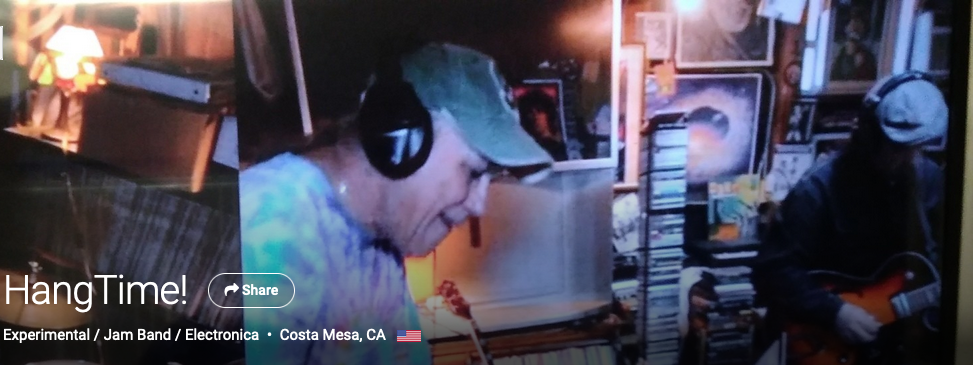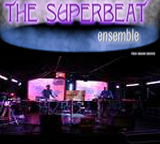Super Beat Ensemble 3-6-11 track 1
This session features several regulars player to the SBE project, and it came out pretty interesting… YOU be the judge of that.
Stephen ‘Maji’ Saunders, percussion,keyboards,harmonica, vocals
Daniel Dominguez- Electric Guitar, Vocals
Featured Artists
Cort Stricker- Electric Guitar
Greg White- Trap Drums
Paul Chun- Bass Guitar, Vocals
PASSINGS: LOUIE BELLSON
Washington Post – Louie Bellson, 84, widely considered one of the world’s greatest drummers, who played with Duke Ellington, Benny Goodman, Tommy Dorsey and Count Basie, died in California of complications from a hip fracture he suffered in November.
A six-time Grammy nominee who performed on more than 200 albums and wrote more than 1,000 compositions and arrangements and a dozen books on percussion, Mr. Bellson was the last of the triumvirate of great percussionists who came out of the big-band era. He was a member of Ellington’s band from 1951 to 1953 and was often the only white musician who performed with it before segregated audiences in the South.
In 1938, while still in high school, he came up with the idea of using two bass drums in his drum set, an addition that became his signature. Two years later, he beat 40,000 others to win a nationwide drumming contest. He joined Benny Goodman’s band before he was 20 years old.
He married singer Pearl Bailey and left Ellington’s band to be her musical director. Over the years, Mr. Bellson performed with such greats as Harry James, Woody Herman, Sarah Vaughan, Ella Fitzgerald, Oscar Peterson, Dizzy Gillespie, Louie Armstrong, Lionel Hampton, James Brown, Sammy Davis Jr., Tony Bennett, Mel Torme and Joe Williams. Just a year ago, he issued what would be his final CD, “Louie & Clark Expedition 2,” and he was still touring last fall.
NAT HENTOFF: JAZZ AND DEMOCRACY
Sam Smith – We’ll still be blessed by his syndicated column, but now that the Village Voice has dumped Nat Hentoff, I’m reminded of what a long and steady influence he has been in my life. I first read him – not as most would today, dealing with such critical issues as our civil liberties – but when he was jazz critic for Down Beat, the must read of any high school and college drummer like myself, especially one who had a show, “Jam With Sam” on the campus radio station. For students like myself, Hentoff was right up there with Freud, Marx and Darwin and other such less swinging minds to which we were being introduced. His evolution from jazz critic to defender of the Constitution makes sense because jazz is one of the great metaphors of democracy.
The essence of jazz is the same as that of democracy: the greatest amount of individual freedom consistent with a healthy community. Each musician is allowed extraordinary liberty during a solo and then is expected to conscientiously back up the other musicians in turn. The two most exciting moments in jazz are during flights of individual virtuosity and when the entire musical group seems to become one. The genius of jazz (and democracy) is that the same people are willing and able to do both.
Daniel King, Jazz Times – From syndicated columnist to social historian, Constitutional scholar and music critic, Nat Hentoff has played many roles in the field of journalism since the 1950s, but none more notable in the eyes of jazz fans than his roles as leading jazz historian, biographer and anecdotist.
He attended Northeastern University and Harvard University in the 40s and hosted a radio show on WMEX in Boston. He took strongly to the local Boston jazz scene and after studying a year at the Sorbonne in Paris in 1950, he returned to the United States to become associate editor of Down Beat magazine (1953-1957). From there, he launched what would soon become one of the most celebrated careers in jazz journalism.
Hentoff was co-editor of the short-lived Jazz Review from 1958 to 1961 and A&R director of the Candid label in 1960 to 1961, during which time he produced important sessions by musicians Charles Mingus, Phil Woods, Benny Bailey, Otis Spann, Cecil Taylor, Abbey Lincoln and other jazz giants.
Apart from Hentoff’s fame in the jazz world, he has also become a fixture in the debate over free speech; a dual-tasked spokesperson whose writing on jazz music and the First Amendment has done much to concretize the link between the two ideals. His writing on the American legal system landed him an American Bar Association Silver Gavel Award, an honorary doctorate of law from Northeastern University, a Guggenheim Fellowship in education and the respect of a faithful readership worldwide.
Nat Hentoff, Village Voice – I’m not retiring; I’ve never forgotten my exchange on that decision with Duke Ellington. In those years, he and the band played over 200 one-nighters a year, with jumps from, say, Toronto to Dallas. On one of his rare nights off, Duke looked very beat, and I presumptuously said: “You don’t have to keep going through this. With the standards you’ve written, you could retire on your ASCAP income.”
Duke looked at me as if I’d lost all my marbles. “Retire!” he crescendoed. “Retire to what?!”
I’m still writing. In 2009, the University Press of California will publish my At the Jazz Band Ball: 60 Years on the Jazz Scene, and, later in the year, a sequel to The War on the Bill of Rights and the Gathering Resistance will be out on Seven Stories Press with the title Is This America? And I’ll be breaking categories elsewhere, including in my weekly syndicated United Media column, which reaches 250 papers, and my jazz and country music pieces in The Wall Street Journal.
I came here in 1958 because I wanted a place where I could write freely on anything I cared about. There was no pay at first, but the Voice turned out to be a hell of a resounding forum. My wife, Margot-later an editor here and a columnist far more controversial than I’ve been-called what this paper was creating “a community of consciousness.” Though a small Village “alternative” newspaper, we were reaching many around the country who were turned off by almost any establishment you could think of.
Being here early on, I felt I’d finally been able to connect with what had first startled and excited me as I was reading my journalism mentor, George Seldes, the first press critic. When I was 15, I saw his four-page newsletter, “In Fact: An Antidote to Falsehoods in the Daily Press.” He broke stories I’d never seen in any other paper, including The New York Times, stories that gave scientific data on how cigarette smoking caused cancer.
Seldes was also a labor man. You could find “In Fact” in some union halls, and for years, his name was blacked out of The New York Times because, in 1934, he testified about journalists’ wages before the National Labor Relations Board just as the Newspaper Guild was trying to organize the Times. . .
Seldes was also my hero when, after Senator Joseph McCarthy called him into a closed-door session to admit to his Bolshevism, the Great Red Hunter eventually came out of the room, looking unprecedentedly subdued as he told the waiting press that Seldes had been “cleared.” George had intimidated Tailgunner Joe. . .
At 94, Seldes was no longer in the news business, but as I came into his hotel room around nine one morning, he was doing what I do every morning: tearing pages out of stacks of newspapers. Instead of saying, “Hello,” he grabbed a handful of clips, gave them to me, and said, “You ought to look into these stories!” Then, smiling, he said, “I’m getting old, yes, but to hell with being mellow.” In 1995, he died at the age of 104 in Hartland Four Corners, Vermont.
My other main mentor, I.F. “Izzy” Stone, was inspired by “In Fact” to start “I.F. Stone’s Weekly,” where mainstream newspaper reporters also sent stories that they couldn’t get into their own papers.
One of the lessons I learned from Izzy was to avoid press conferences: “You’re not going to get the real story there,” he’d say. Instead, I learned from him to find mid-level workers in bureaucracies whom reporters seldom thought to interview. . .
I was in my twenties when I learned my most important lesson from Izzy Stone: “If you’re in this business because you want to change the world, get another day job. If you are able to make a difference, it will come incrementally, and you might not even know about it. You have to get the story and keep on it because it has to be told.”
Around the country, a lot of reporters are being excessed, and print newspapers may soon become collectors’ items. But over the years, my advice to new and aspiring reporters is to remember what Tom Wicker, a first-class professional spelunker, then at The New York Times, said in a tribute to Izzy Stone: “He never lost his sense of rage.”
Neither have I. See you somewhere else. Finally, I’m grateful for the comments on the phone and the Web. It’s like hearing my obituaries while I’m still here.
Maji’s Music Servante’
Maj’s Secret Music Stash……. Le Servante’
This is an MP3 and M4a collection
which features The Maji somewhere in the mix…..


Crazy
4-19-06, (mp3, 4.3mb)

bluelonelymaninspace
into getonup w jam 3-26-06 (mp3, 22mb)

SPECIALCUT!!
Ragin’Raga by Cort Stricker & The Maji

Stir It Up (Bob Marley) (Majik~*, Ricky Enriquez, Jared Jesperson,
Thad Miller)
Sugaree
(Grateful Dead) (Majik~*, Ricky Enriquez)
Goathill
Blues (Ricky Enriquez, Majik)
Allison
(Elvis Costello) (Ricky Enriquez, Majik)
Me n My Uncle (Ricky Enriquez, Majik)

First jam with Majik~*
(BUS-Jared,Michael, Vincent, Gregory, Daniel, Majik)
Window Paints –
Jared Jesperson, Stephen Saunders (BUS-Jared, Michael, Vincent,
Gabriel, Daniel, Majik)
All Along The Watchtower -BobDylan
(BUS-Jared, Michael, Vincent, Gregory, Daniel, Majik)
Let It Shine- Retro look at the Band BUS (mp3. 6.8mb)

(Big PICKUP band Chip,Tom,Chris,Bryan.Majik)


(Shotgun Ragtime Band and Daniel
“Tron” Wilsterman)

Little Wing (Jimmy Hendrix) (Shotgun Ragtime Band)
Korg Duet (Chris Roberts and Majik)
You Don’t Have To Stay (Bobby Dalton)-(Majik solo)

1993-Present©majik.org MADE BY MAJIK~*





